|
|
|
Sort Order |
|
|
|
Items / Page
|
|
|
|
|
|
|
| Srl | Item |
| 1 |
ID:
082480
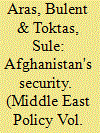

|
|
|
| 2 |
ID:
108462
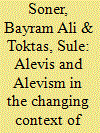

|
|
|
|
|
| Publication |
2011.
|
| Summary/Abstract |
The Justice and Development Party (JDP, Adalet ve Kalk?nma Partisi) has launched a rapprochement policy toward the Alevis. The JDP's Alevi Opening has presented a unique case in Turkey's latest identity politics not only because Alevi claims, for the first time, came to be involved in political processes for official recognition and accommodation, but also because the process was handled by a political party which is regarded to have retained Islamist roots in Sunni interpretation. This article explores the JDP's Alevi Opening process and tries to explain the motivations behind the party's decision to incorporate the Alevi question in its political agenda. What is more, the debate that the opening has caused is also under scrutiny with the positions and arguments held by the actors and the agencies involved in the process, e.g., the Alevis (the secularist and the conservative wings), the General Directorate of Religious Affairs, the National Security Council, the JDP leadership and the Islamist intellectuals.
|
|
|
|
|
|
|
|
|
|
|
|
|
|
|
|
| 3 |
ID:
078943
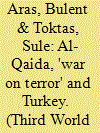

|
|
|
|
|
| Publication |
2007.
|
| Summary/Abstract |
The new wave of international terrorism gained strength in the aftermath of the 9/11 attacks, threatening not only the USA and its allies but also, as seen in the latest incidents, a significant part of the world. Continuing al-Qaida attacks signify the vulnerability and weakness of defence, security and intelligence systems in the face of the new international terror. The terror network has created an image of a postmodern virtual state. We argue that it has been shaped by a common ideology rather than in physical terms. Thus it is necessary to develop novel approaches. In this article we discuss Turkey's struggle against the new terror, underlining the fact that it is a Muslim majority state and has lively and dynamic Islamic traditions and different shades of Islamic belief. This situation makes the discussion more interesting, focusing on the position, perception, difficulties and struggle of a Muslim state with a democratic and secular mode of government vis-à-vis an allegedly Islam-inspired international terror network. There is an urgent need to develop an international terror strategy to counter terror attacks against Turkey, Britain, Egypt and others. We underscore the vital requirement of reconciling the macro-schemes and priorities of the global 'war on terror' with the national conditions and needs of the other countries involved in the struggle against the terror network.
|
|
|
|
|
|
|
|
|
|
|
|
|
|
|
|
| 4 |
ID:
072181
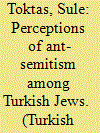

|
|
|
|
|
| Publication |
2006.
|
| Summary/Abstract |
It is commonly believed that there is little or no anti?Semitism in Turkey. For this reason, the Turkish Jewish community is considered to be fortunate. The 1942 Capital Tax, the September 6-7 Events in 1955, and even the Thrace Incidents of 1934, in which the Jews were the main targets of violence, are considered to be examples of discrimination against all non?Muslim minorities in Turkey. This study investigates the validity of this optimistic view with the help of empirical research conducted on a sample group of Turkish Jews. More precisely, it deals with the question of how Jews living in Turkey perceive anti?Semitism with a perspective that prioritizes the voices of the Jews themselves and gives an account of their experience regarding their status as a religious minority in a Muslim majority society. This paper discusses the results of the research based on in?depth interviews with Jewish respondents and reflects on the nature, sources, and extent of anti?Semitism in contemporary Turkey in the eyes of Turkey's Jews themselves.
|
|
|
|
|
|
|
|
|
|
|
|
|
|
|
|
| 5 |
ID:
070080
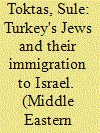

|
|
|
| 6 |
ID:
099486
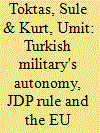

|
|
|
|
|
| Publication |
2010.
|
| Summary/Abstract |
This article tackles the question of Europeanization in Turkey's civil-military relations and the extent to which the EU has served as an anchor in the civilian control over the Turkish Armed Forces. We argue that the EU membership process has necessitated democratization in civil-military relations; EU support was not sufficient for fully integrated democratic control of the armed forces (DECAF) as there are still problems in the democratization of civil-military relations. Since the 2000s, there has been a DECAF reform process taking place but due to historical deficiencies in Turkish polity, like the civilian incapacity to change the priority given to the military's role in the making of the security culture, the European norms of DECAF, such as a constitutional division between the civilian and military authorities, political neutrality of the military and parliamentary control of the defense budget, is formal. In the first part, we aim to give background information to DECAF reforms in Turkey. The second part discusses Justice and Development Party (JDP)-Turkish General Staff (TGS) relations between 2002 and 2007. The third part assesses civil-military relations in the period since 2007. The last section pays special attention to the significance of the question of a Turkish way to Europeanization especially in the field of civil- military relations.
|
|
|
|
|
|
|
|
|
|
|
|
|
|
|
|
| 7 |
ID:
129557
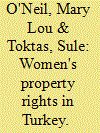

|
|
|
|
|
| Publication |
2014.
|
| Summary/Abstract |
This article takes Turkey as a case study, exploring marital and inheritance regimes with regard to their impact on women and their ability to protect women's property rights. The aim of the study is to bring to light the workings of the legal system that regulate the acquisition of property and to scrutinize the gap between the law and its practice in Turkish society. By taking this approach, the article does not only focus on laws but also on how these laws are adopted by society. Thus, two levels of analysis-de jure and de facto-are utilized for an investigation of women's property rights and hence their social and economic status.
|
|
|
|
|
|
|
|
|
|
|
|
|
|
|
|
|
|
|
|
|